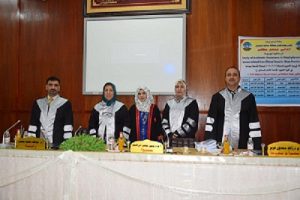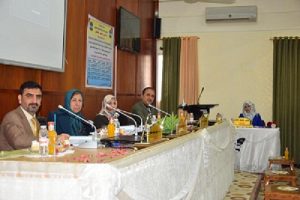The master’s thesis of the postgraduate student (Amani Munaem Mutasher) was discussed at the College of Science / University of Misan/ Department of Biology, the thesis was under the tilte:
Study of Antibiotic Resistance in Staphylococcus aureus Isolated from Clinical Cases in Misan province /Iraq.
The panel consisted of the gentlemen listed below:
1- Prof. Awatif Hamid Muheisen/ Microbiology/ College of Science / Basra University/ President.
2- Ass. Prof. Nabil Saleem Saeed. Microbiology/ College of Science / Kufa University/ Member.
3- Ass. Prof. Wasan Jaafer Abrahim. BioTech/ College of Agriculture / Misan University/ Member.
4- Ass. Prof. Zahid Saadoun Aziz. Microbiology / College of Agriculture / Misan University/ Member.
The discussion took place at the hall of Imam Sadiq.
The thesis included the collection of samples from various sources and from Al-Sader General Teaching Hospital and Hospital of
Obstetrics, child and central public health laboratory in Maysan, and conducted the standard preliminary implant tests, and confirmed the results using optional and differential transplant, biochemical tests and the vitic 2 device.
Drug allergy tests were carried out on the direction of antibiotics most commonly used to treat staphylococcus aureus, as well as a series of confirmed tests for the production of beta-actamys, induced resistance to Clindamaisin and tests to detect phenotype resistance to vancomycin.
To detect the genetic and molecular basis of resistance to bacteria for various antibacterials, pcr technique was used to detect penicillin-resistant blaZ genes, Erm A-resistant anti-erythromycin, clendamaysin, aacA-aphdin-resistant genes and van A. and Van B anti-vancomycin-resistant genes.
The results showed multiple resistance to staphylococcus bacteria for different groups of antibiotics, whether at the phenotype or molecular genetic level, with differences according to the different groups of antibiotics.
The study recommended the need to use some important tests to detect the phenotype resistance in the routine examinations of hospital laboratories as well as the use of molecular tests, because it is the best way to detect resistance at the molecular level as it emphasized the theory of non-random and excessive use of antibiotics, especially in intensive care units because it reduces the chances of success of treatment .

